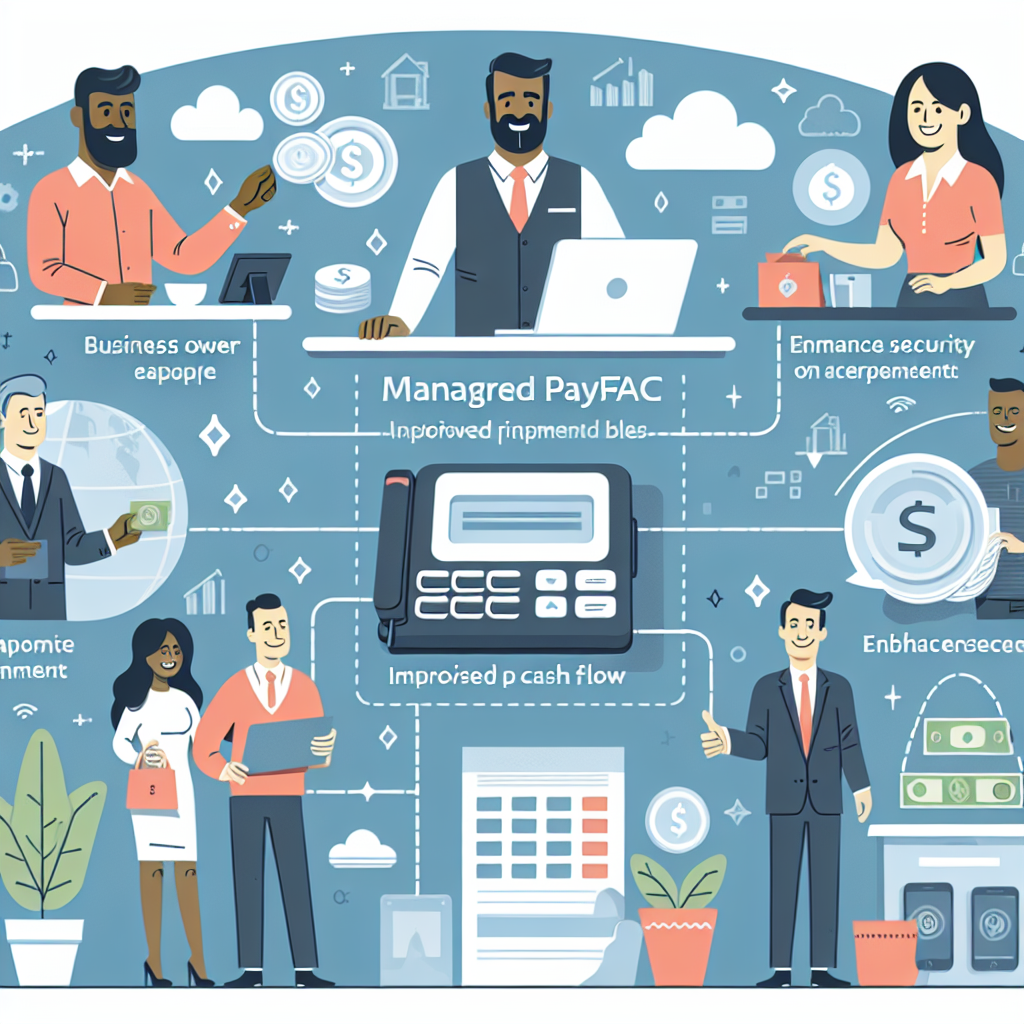-
Table of Contents
- Streamlining Payment Processing: How Managed Payfac Simplifies Transactions for Businesses
- Enhancing Security: The Advantages of Managed Payfac for Protecting Business and Customer Data
- Increasing Revenue: Exploring the Financial Benefits of Utilizing Managed Payfac Services
- Improving Customer Experience: How Managed Payfac Enhances Payment Options and Convenience
- Scalability and Growth: Leveraging Managed Payfac to Support Business Expansion and Adaptability
- Q&A
Streamlining Payment Processing: How Managed Payfac Simplifies Transactions for Businesses
In today’s fast-paced business world, efficiency is key. Companies are constantly looking for ways to streamline their operations and improve their bottom line. One area where businesses can make significant improvements is in their payment processing. Traditional payment processing methods can be time-consuming and costly, requiring businesses to work with multiple vendors and navigate complex systems. However, there is a solution that can simplify the payment process and provide numerous benefits for businesses: managed Payfac.
Managed Payfac, short for managed payment facilitator, is a service that combines the functions of a payment gateway and a merchant account into one streamlined solution. By partnering with a managed Payfac, businesses can simplify their payment processing and enjoy a range of benefits.
One of the primary advantages of managed Payfac is the ability to consolidate payment processing. Instead of working with multiple vendors, businesses can rely on a single provider to handle all aspects of their payment transactions. This eliminates the need for businesses to manage multiple relationships and reduces the risk of errors or miscommunication. With a managed Payfac, businesses can have peace of mind knowing that their payment processing is being handled efficiently and effectively.
Another benefit of managed Payfac is the simplified onboarding process. When businesses work with traditional payment processors, they often have to go through a lengthy and complex application process. This can be time-consuming and frustrating, especially for small businesses or startups. Managed Payfac simplifies the onboarding process, making it easier for businesses to get up and running quickly. With a streamlined application and approval process, businesses can start accepting payments faster and focus on growing their business.
Managed Payfac also offers businesses the advantage of enhanced security and compliance. Payment processing involves sensitive customer data, and businesses have a responsibility to protect that information. With a managed Payfac, businesses can benefit from advanced security measures and robust compliance protocols. This helps to minimize the risk of data breaches and ensures that businesses are meeting industry standards and regulations. By partnering with a managed Payfac, businesses can have confidence in the security of their payment processing.
In addition to these benefits, managed Payfac can also provide businesses with valuable reporting and analytics. By consolidating payment processing, businesses can access comprehensive data and insights into their transactions. This information can be used to identify trends, track sales performance, and make informed business decisions. With the ability to analyze payment data, businesses can gain a competitive edge and optimize their operations.
In conclusion, managed Payfac offers numerous benefits for businesses looking to streamline their payment processing. By consolidating payment functions, simplifying onboarding, enhancing security, and providing valuable reporting and analytics, managed Payfac can help businesses improve efficiency, reduce costs, and focus on what they do best. In today’s competitive business landscape, it is essential for companies to embrace innovative solutions like managed Payfac to stay ahead of the curve and drive success.
Enhancing Security: The Advantages of Managed Payfac for Protecting Business and Customer Data
In today’s digital age, businesses are increasingly relying on electronic payment systems to streamline their operations and provide convenience to their customers. However, with the rise in cyber threats and data breaches, it has become imperative for businesses to prioritize the security of their payment processes. This is where Managed Payfac comes into play, offering a comprehensive solution for businesses to enhance the security of their payment systems and protect both their business and customer data.
One of the key advantages of Managed Payfac is its ability to provide businesses with a secure and compliant payment infrastructure. By partnering with a Managed Payfac provider, businesses can ensure that their payment processes are in line with industry standards and regulations. This includes adhering to Payment Card Industry Data Security Standard (PCI DSS) requirements, which are designed to protect cardholder data and prevent unauthorized access. With a Managed Payfac, businesses can rest assured that their payment systems are secure and that they are taking the necessary steps to protect sensitive customer information.
Another benefit of Managed Payfac is its ability to simplify the payment process for businesses. With a Managed Payfac, businesses can consolidate their payment systems into a single platform, making it easier to manage and monitor transactions. This not only saves businesses time and resources but also reduces the risk of errors and discrepancies in the payment process. By streamlining their payment systems, businesses can improve efficiency and provide a seamless payment experience for their customers.
Managed Payfac also offers businesses the advantage of real-time transaction monitoring and fraud detection. With advanced analytics and monitoring tools, Managed Payfac providers can identify and flag suspicious transactions in real-time, helping businesses to detect and prevent fraudulent activities. This proactive approach to fraud prevention can save businesses from potential financial losses and reputational damage. By leveraging the expertise and technology of a Managed Payfac provider, businesses can stay one step ahead of cybercriminals and protect their financial interests.
Furthermore, Managed Payfac can help businesses mitigate the risks associated with storing and transmitting sensitive payment data. With a Managed Payfac, businesses can offload the responsibility of securely storing and transmitting payment data to a trusted third-party provider. This reduces the risk of data breaches and minimizes the potential impact on the business and its customers. By entrusting their payment data to a Managed Payfac, businesses can focus on their core operations and leave the complexities of data security to the experts.
In conclusion, Managed Payfac offers numerous benefits for businesses looking to enhance the security of their payment systems. From ensuring compliance with industry standards to simplifying the payment process and detecting fraud in real-time, Managed Payfac provides businesses with a comprehensive solution for protecting their business and customer data. By partnering with a Managed Payfac provider, businesses can strengthen their payment infrastructure, improve efficiency, and gain peace of mind knowing that their payment systems are secure. In an increasingly digital world, investing in the security of payment processes is not only a smart business move but also a necessary one to safeguard the interests of both businesses and their customers.
Increasing Revenue: Exploring the Financial Benefits of Utilizing Managed Payfac Services

In today’s fast-paced business world, companies are constantly looking for ways to increase revenue and streamline their operations. One area that has gained significant attention in recent years is the use of managed payment facilitator (Payfac) services. This article will explore the financial benefits of utilizing managed Payfac services and how they can help businesses increase their revenue.
First and foremost, it is important to understand what a managed Payfac is. A Payfac is a company that acts as a middleman between businesses and payment processors, allowing businesses to accept credit card payments without the need for their own merchant account. Managed Payfac services take this concept a step further by providing businesses with a comprehensive suite of payment processing solutions, including payment gateway integration, fraud prevention, and customer support.
One of the key financial benefits of utilizing managed Payfac services is the ability to increase revenue. By offering customers the convenience of multiple payment options, businesses can attract more customers and increase sales. Studies have shown that businesses that accept credit card payments tend to generate higher sales volumes compared to those that only accept cash or checks. With a managed Payfac, businesses can accept all major credit cards, as well as alternative payment methods such as mobile wallets and digital currencies, giving customers more ways to pay.
In addition to increasing sales, managed Payfac services can also help businesses reduce costs. By outsourcing payment processing to a third-party provider, businesses can eliminate the need for expensive hardware and software, as well as the associated maintenance and support costs. Furthermore, managed Payfac services often offer competitive pricing models, allowing businesses to save on transaction fees and other processing costs. These cost savings can have a significant impact on a business’s bottom line, especially for small and medium-sized enterprises with limited resources.
Another financial benefit of utilizing managed Payfac services is the ability to streamline operations and improve efficiency. With a managed Payfac, businesses can consolidate all their payment processing activities into a single platform, making it easier to manage and reconcile transactions. This can save businesses valuable time and resources, allowing them to focus on other core aspects of their operations. Furthermore, managed Payfac services often provide businesses with real-time reporting and analytics, giving them valuable insights into their sales performance and customer behavior. This data can be used to make informed business decisions and optimize revenue generation strategies.
Lastly, managed Payfac services can also help businesses mitigate the risk of fraud and chargebacks. Payment processors often have sophisticated fraud prevention tools and systems in place to detect and prevent fraudulent transactions. By utilizing these tools, businesses can minimize the financial impact of fraudulent activities and protect their revenue. Additionally, managed Payfac services typically offer chargeback management services, helping businesses navigate the complex process of disputing chargebacks and recovering lost funds.
In conclusion, managed Payfac services offer a range of financial benefits for businesses. From increasing revenue and reducing costs to streamlining operations and mitigating fraud, the advantages of utilizing a managed Payfac are clear. As businesses continue to adapt to the evolving payment landscape, leveraging the expertise and resources of a managed Payfac can be a strategic move to drive financial growth and success.
Improving Customer Experience: How Managed Payfac Enhances Payment Options and Convenience
In today’s fast-paced business environment, providing a seamless and convenient payment experience for customers is crucial. With the rise of digital transactions, businesses need to adapt and offer a variety of payment options to meet customer expectations. One solution that has gained popularity in recent years is the concept of a Managed Payfac, which stands for Managed Payment Facilitator. This article will explore the benefits of a Managed Payfac for businesses, specifically focusing on how it enhances payment options and convenience for customers.
First and foremost, a Managed Payfac simplifies the payment process for businesses. Traditionally, businesses had to go through a lengthy and complex process to set up their own payment infrastructure. This involved establishing relationships with multiple payment processors, complying with various regulations, and investing in expensive technology. However, with a Managed Payfac, businesses can outsource these tasks to a third-party provider who specializes in payment facilitation. This not only saves time and resources but also ensures that businesses can start accepting payments quickly and efficiently.
One of the key advantages of a Managed Payfac is the ability to offer a wide range of payment options to customers. In today’s digital age, customers expect to be able to pay using their preferred method, whether it’s credit cards, mobile wallets, or even cryptocurrencies. By partnering with a Managed Payfac, businesses gain access to a comprehensive suite of payment options, allowing them to cater to the diverse needs and preferences of their customers. This not only improves customer satisfaction but also increases the likelihood of repeat business.
Furthermore, a Managed Payfac enhances convenience for both businesses and customers. With a traditional payment setup, businesses often have to deal with multiple payment processors, each with its own set of rules and procedures. This can be time-consuming and confusing, especially for small businesses with limited resources. However, with a Managed Payfac, businesses have a single point of contact for all their payment needs. This streamlines the payment process, reduces administrative burden, and allows businesses to focus on their core operations.
From a customer perspective, a Managed Payfac offers a seamless and hassle-free payment experience. Customers no longer have to navigate through different payment gateways or remember multiple login credentials. Instead, they can make payments using a unified and user-friendly interface provided by the Managed Payfac. This not only saves time but also instills confidence in customers, knowing that their payment information is secure and protected.
In addition to convenience, a Managed Payfac also enhances security for businesses and customers alike. Payment fraud is a growing concern in today’s digital landscape, and businesses need to take proactive measures to protect themselves and their customers. By partnering with a Managed Payfac, businesses can leverage the provider’s expertise and advanced security measures. This includes encryption technologies, fraud detection systems, and compliance with industry standards. As a result, businesses can minimize the risk of data breaches and fraudulent activities, providing peace of mind to both themselves and their customers.
In conclusion, a Managed Payfac offers numerous benefits for businesses, particularly in terms of improving customer experience. By simplifying the payment process, offering a wide range of payment options, enhancing convenience, and ensuring security, businesses can provide a seamless and convenient payment experience for their customers. In today’s competitive business landscape, investing in a Managed Payfac is a strategic move that can help businesses stay ahead of the curve and drive customer loyalty.
Scalability and Growth: Leveraging Managed Payfac to Support Business Expansion and Adaptability
In today’s fast-paced business environment, scalability and growth are key factors for success. As businesses expand and adapt to changing market conditions, they need a payment processing solution that can keep up with their evolving needs. This is where a managed payment facilitator, or payfac, can play a crucial role. By leveraging the services of a managed payfac, businesses can ensure that their payment processing capabilities are scalable and adaptable to support their growth.
One of the main benefits of using a managed payfac is the ability to scale payment processing operations as the business grows. Traditional payment processing solutions often require businesses to go through a lengthy and complex process to increase their processing capacity. This can be a major roadblock for businesses that are experiencing rapid growth and need to quickly scale their operations. With a managed payfac, businesses can easily scale their payment processing capabilities to meet their increasing transaction volumes. This allows them to focus on their core business activities without worrying about the limitations of their payment processing infrastructure.
Another advantage of using a managed payfac is the ability to adapt to changing market conditions. In today’s dynamic business landscape, businesses need to be agile and responsive to stay ahead of the competition. This includes being able to quickly adapt their payment processing capabilities to meet the changing needs of their customers. A managed payfac can provide businesses with the flexibility they need to adapt to new payment methods, technologies, and regulatory requirements. This ensures that businesses can continue to provide a seamless and convenient payment experience to their customers, regardless of how the payment landscape evolves.
Furthermore, a managed payfac can also help businesses reduce their operational costs. Traditional payment processing solutions often involve multiple intermediaries, each charging their own fees. This can result in a complex and costly payment processing ecosystem for businesses. By using a managed payfac, businesses can consolidate their payment processing operations into a single platform, eliminating the need for multiple intermediaries. This not only simplifies the payment process but also reduces costs associated with transaction fees and integration expenses. By streamlining their payment processing operations, businesses can allocate their resources more efficiently and focus on driving growth.
In conclusion, a managed payfac offers several benefits for businesses looking to scale and grow. By leveraging the services of a managed payfac, businesses can easily scale their payment processing capabilities to meet their growing transaction volumes. Additionally, a managed payfac provides businesses with the flexibility to adapt to changing market conditions, ensuring that they can continue to provide a seamless payment experience to their customers. Furthermore, by consolidating payment processing operations into a single platform, businesses can reduce operational costs and allocate their resources more efficiently. Overall, a managed payfac is a valuable tool for businesses looking to achieve scalability and growth in today’s competitive business landscape.
Q&A
1. What is a Managed Payfac?
A Managed Payfac is a third-party service provider that enables businesses to act as payment facilitators without the need for direct involvement in the complex payment processing infrastructure.
2. What are the benefits of using a Managed Payfac?
Using a Managed Payfac allows businesses to streamline their payment processes, reduce costs, and simplify compliance requirements. It also provides access to advanced payment features and technologies.
3. How does a Managed Payfac simplify compliance for businesses?
A Managed Payfac takes on the responsibility of ensuring compliance with various payment regulations, such as PCI DSS, AML, and KYC. This relieves businesses from the burden of managing and maintaining compliance on their own.
4. Can a Managed Payfac help businesses reduce costs?
Yes, a Managed Payfac can help businesses reduce costs by eliminating the need for building and maintaining their own payment infrastructure. It also provides economies of scale, allowing businesses to benefit from lower transaction fees and other cost savings.
5. What advanced payment features can businesses access through a Managed Payfac?
Through a Managed Payfac, businesses can access features like multi-currency support, recurring billing, fraud prevention tools, and real-time reporting. These features enhance the payment experience for both businesses and their customers.








